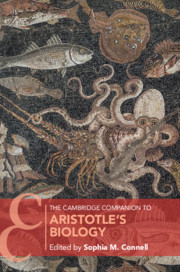Book contents
- The Cambridge Companion to Aristotle’s Biology
- OTHER VOLUMES IN THE SERIES OF CAMBRIDGE COMPANIONS
- The Cambridge Companion to Aristotle’s Biology
- Copyright page
- Contents
- Figures
- Contributors
- Abbreviations
- Introduction
- Chapter 1 Biology and Theology in Aristotle’s Theoretical and Practical Sciences
- Chapter 2 The Presocratics, Plato, and Aristotle’s Biology
- Chapter 3 Aristotle’s Biology and Early Medicine
- Chapter 4 Empiricism and Hearsay in Aristotle’s Zoological Collection of Facts
- Chapter 5 Parts of Animals Book 1 on Methods of Inquiry
- Chapter 6 Teleological Perspectives in Aristotle’s Biology
- Chapter 7 Aristotle’s Biological Metaphysics
- Chapter 8 Life-Cycles and the Actions of Nutritive Soul in Aristotle
- Chapter 9 Aristotle on Animal Generation and Hereditary Resemblance
- Chapter 10 The Science of Perception in Aristotle
- Chapter 11 Aristotle’s Theory of Animal Agency and the Problem of Self-Motion
- Chapter 12 Animal Cognition in Aristotle
- Chapter 13 Elements of Biology in Aristotle’s Political Science
- Chapter 14 The Early Reception of Aristotle’s Biology
- Chapter 15 The Reception of Aristotle’s Biology in Late Antiquity and Beyond
- Chapter 16 Aristotelian Teleology and Philosophy of Biology in the Darwinian Era
- Chapter 17 Aristotle and Contemporary Biology
- Afterword: Philosophical Issues in Aristotle’s Biology – Its Coming-to-Be and Its Being
- Bibliography
- General Index
- Index Locorum
- OTHER VOLUMES IN THE SERIES OF CAMBRIDGE COMPANIONS
- References
Chapter 5 - Parts of Animals Book 1 on Methods of Inquiry
Published online by Cambridge University Press: 14 May 2021
- The Cambridge Companion to Aristotle’s Biology
- OTHER VOLUMES IN THE SERIES OF CAMBRIDGE COMPANIONS
- The Cambridge Companion to Aristotle’s Biology
- Copyright page
- Contents
- Figures
- Contributors
- Abbreviations
- Introduction
- Chapter 1 Biology and Theology in Aristotle’s Theoretical and Practical Sciences
- Chapter 2 The Presocratics, Plato, and Aristotle’s Biology
- Chapter 3 Aristotle’s Biology and Early Medicine
- Chapter 4 Empiricism and Hearsay in Aristotle’s Zoological Collection of Facts
- Chapter 5 Parts of Animals Book 1 on Methods of Inquiry
- Chapter 6 Teleological Perspectives in Aristotle’s Biology
- Chapter 7 Aristotle’s Biological Metaphysics
- Chapter 8 Life-Cycles and the Actions of Nutritive Soul in Aristotle
- Chapter 9 Aristotle on Animal Generation and Hereditary Resemblance
- Chapter 10 The Science of Perception in Aristotle
- Chapter 11 Aristotle’s Theory of Animal Agency and the Problem of Self-Motion
- Chapter 12 Animal Cognition in Aristotle
- Chapter 13 Elements of Biology in Aristotle’s Political Science
- Chapter 14 The Early Reception of Aristotle’s Biology
- Chapter 15 The Reception of Aristotle’s Biology in Late Antiquity and Beyond
- Chapter 16 Aristotelian Teleology and Philosophy of Biology in the Darwinian Era
- Chapter 17 Aristotle and Contemporary Biology
- Afterword: Philosophical Issues in Aristotle’s Biology – Its Coming-to-Be and Its Being
- Bibliography
- General Index
- Index Locorum
- OTHER VOLUMES IN THE SERIES OF CAMBRIDGE COMPANIONS
- References
Summary
Parts of Animals Book 1 is mainly concerned with a discussion of the norms (horoi) that govern natural (biological) inquiry. In the present chapter I examine one of those norms, which concerns “how one ought to carry out an investigation of animals” (PA 1.1.639b3–5). Aristotle examines two alternative methods. The first recommends investigating animals species by species (e.g. sparrow, finch, raven). The second begins by grouping species into wider kinds (e.g. bird) and studies those features that belong to them as members of those wider kinds before going on to study those variations that differentiate one form of that kind from another (e.g. variations in beak shape). While scholars have been tempted to conclude that Aristotle rejects the first method outright, I argue that he thinks both approaches are important tools in the biologist’s tool-kit (PA 1.4.644b1–6). In the final section of the chapter I show how this discussion helps bring into focus the broader controversy surrounding the relation between the scientific theory presented in the Posterior Analytics and Aristotle’s scientific practice in the biological works.
- Type
- Chapter
- Information
- The Cambridge Companion to Aristotle's Biology , pp. 83 - 96Publisher: Cambridge University PressPrint publication year: 2021



